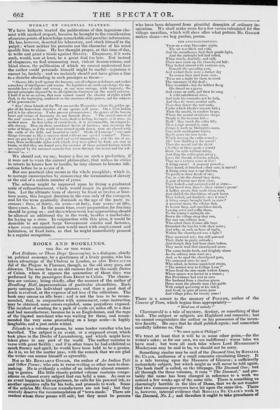MURRAY ON COLONIAL SLAVERY.
'WE have hitherto treated the publications of this ingenious che- mist with marked respect, because he brought to the consideration . of curious points of knowledge remarkable and peculiar information. He has, however, deserted his laboratory, and stuck himself in the . pulpit ; where neither his pursuits nor the character of his mind -qualify him to shine. He has thought proper, at this time of day, to write and print a tirade against Slavery. Eloquence, if it were • such, would, now at least, be a great deal too late. But instead of eloquence, we find unmeaning rant, violent denunciations, and blind abuse, the publication of which we cannot understand how the author could persuade himself might be useful—injurious it • cannot be, luckily : and we certainly should not have given a line to a diatribe abounding in such passages as these— Slavery lifts itself against the heavens sets all religion at defiance, and makes a mockery of intelligence and reason. No legislation on earth can change the im- mutable laws of right and wrong; or any man outrage, with impunity, the eternal principles imposed by its all-righteous Governor on the moral universe. i I hold t to be an axiom, that man cannot cancel the charter of rights which God, in the beginning, conferred on the creatures of his power, and the subjects of his government."
"Alas these Islands of the West are not the Hesperides where the golden ap- ples of the benevolent charities of our species will grow. On a West Indian soil it is far otherwise. Under present circumstances, the graces of the human
heart and virtues of humanity do not flourish there. "f he renial current of the soul' ceases to flow ; and the heart, dead to feeling, heroines, as it were, an ossified mass. In that valley of moral death, it is interminable, inextinguish- able slavery. Men are there considered beasts of burden ; and, reversing the order of things as if the world were turned upside down, men are classed ' the cattle of the field, and branded as such ! Shade of Linnams ! can such things o'ercome us like a summer cloud without our special wonder?"There, men are put beyond the pale of civil and social immunities' and the ties of na-
• tore; ?hose inabenalde rights with which they were gifted by God, are rent in twain, so that-they are denied even the exercise of those natural feelings whirls are enjoyed by the untamed ;whoa's that roam through the desert and the wit- , • derness"-”.,
We should not, we say, bestow a line on such a production, if it were not to warn the natural philosopher, that unless he sticks to retorts he knows how to handle, he may chance to become ridi- -culous before he is aware of it.
• But one practical idea ,occurs in the whole pamphlet; which is, to manage emancipation by announcing the termination of slavery • at the end of a certain number of years.
The scheme might be • improved upon by fixing a graduated seek of enfranchisement, -which would insure its gradual opera- . tion. Let the ultimate term of slavery be fixed at twelve or four- teen years, this longest duration in the case only of the youngest, and let the term gradually diminish as the age of the party in- creases : thus, at thirty, six years—at forty, four years—at fifty, • three years, &c. In the mean time, every preparation for freedom should be going on ; and those whose term was approaching should . be allowed an additional day in the week, besides a market-day for laying up a store. In conjunction with this plan, it would be desirable to set apart large Government estates and factories, where every emancipated man would meet with employment and • habitation, at fixed rates, so that he might immediately proceed to a regular occupation.


























 Previous page
Previous page